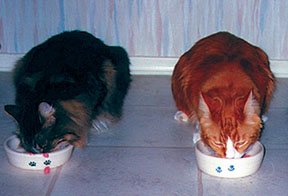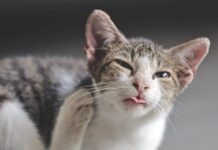Dry skin rarely occurs in cats, and when it does, it may not be serious. Home diagnosis and treatment options are limited, however, because it is difficult to diagnose the underlying cause – and there is the possibility of systemic disease.


288
What veterinarians call dry skin is characterized by dandruff-like flaking or as a greasy coat. Defects in the normal turnover of the skin are the culprit, but determining the root cause – as well as the best treatment – usually requires a veterinarian.
Dry skin or dandruff disease manifests itself differently in different cats, says veterinary dermatologist William Miller, Jr., VMD, of Cornell Universitys College of Veterinary Medicine. Diseases that cause dry skin also cause greasy skin, and vice versa. Dandruff-like flakes can be small in size and number, or large and quite numerous. They may be localized to one part of your cats body or cover a good part of the body.
A cats age, the part of body affected and the extent of the dry skin offer important clues to causes and treatment. Occasionally, cats are born with a genetic predisposition to dry skin. When trouble starts in kittens, its probably genetic, explains Dr. Miller. But if a cat has been normal all its life and suddenly develops skin problems at age six, you can eliminate genes as the cause.
Localized Dry Skin Caused by Pests
Fleas, mites or ringworm (a fungal infection) are the usual culprits for a localized flaky or greasy coat. Cats with these parasites typically scratch and lick affected areas. Owners can readily see fleas and flea excrement on irritated skin, whereas mites and fungi are diagnosed through skin scrapings or a fungal culture. Even if an owner suspects that his cat has mites, different species of these pests require different topical medications. In other words, treatment is beyond the experience of most owners. Similarly, fungal infections require prescription medication.
Commercial flea control products safely eliminate fleas from cats. Purchasing flea products from your veterinarian is a good idea whenever possible because generic flea-control products sold in pet stores and supermarkets may not work well for fleas that thrive in your geographic area.
Generalized Dry Skin
Dandruff or oiliness over the entire coat may indicate serious systemic disease, says Dr. Miller. But the two most common causes of flakiness – low humidity and poor diet – are easily remedied.
Dry, intense heat from wood stoves or radiators can be made more cat friendly by placing a pan of water atop your heating unit or by using an electric humidifier (just remember to clean the humidifier regularly because it can harbor mold spores and bacteria if dirty).
In the absence of low humidity, an owner should consider the cats diet as a potential source of generalized dry or oily skin. Cat owners think theyre pampering their pets by giving them table scraps or meat, says Dr. Miller. But cats were never meant to eat human food as their sole diet. Almost any commercial cat food provides better, more balanced nutrition than the most expensive steak or fish.
Another potential dietary cause of dry skin is low-fat foods, which are sometimes prescribed for obese cats or those with high blood lipids.
If low humidity or a poor diet arent causing your cats skin condition, your feline companion may be suffering from a serious systemic ailment such as liver disease or diabetes. At this point, owners should turn their cats care over to the veterinarian, emphasizes Dr. Miller.
Like humans, cats suffer from diabetes, liver disease or a variety of other internal illnesses that can cause dry or oily skin. Feline diabetes is usually insulin-dependent, a condition for which the only treatment is insulin by injection once or twice a day. Liver disease in cats may be caused by drugs, poisons, viruses or other factors.
No Self-Diagnosis
Owners must recognize that beyond fleas, there are very few causes of dry or oily skin that they should address on their own, says Dr. Miller. With serious systemic disease, the longer that owners wait to seek professional help, the more serious the problem becomes. Most causes of dry skin in cats are not life-and-death emergencies. But delaying proper care for weeks or months nearly always makes treatment more difficult, more expensive for the owner and more uncomfortable for the cat.



